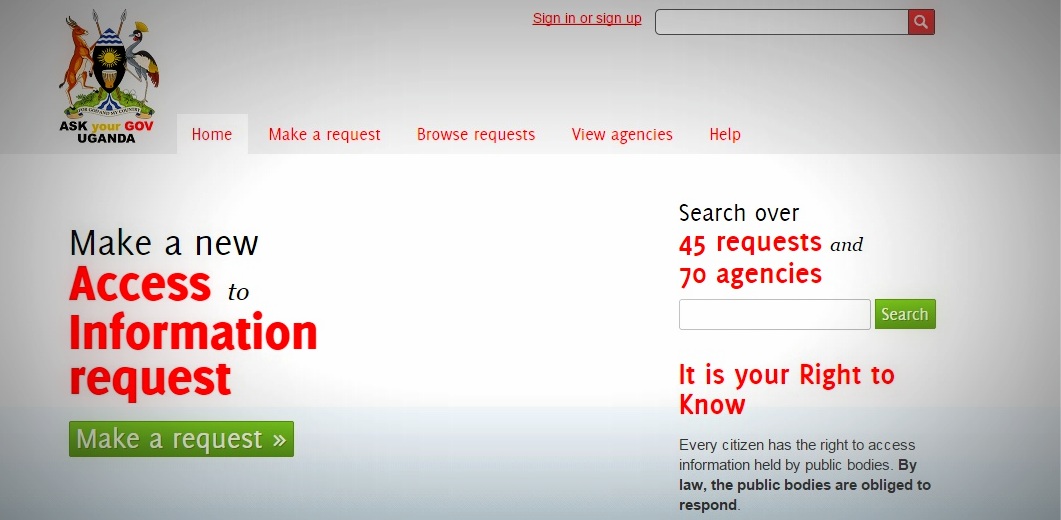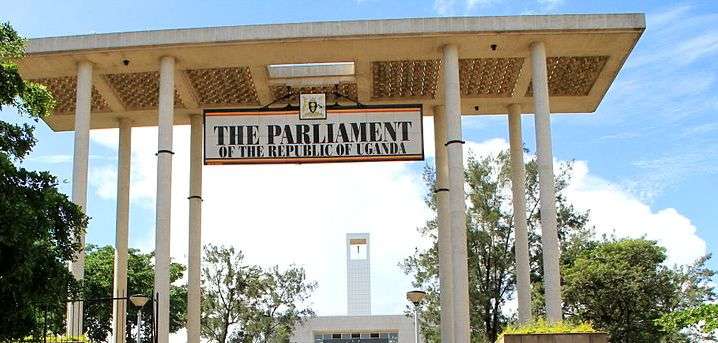By Esther Nakkazi |
On September 28, 2015, the International Right to Know Day was commemorated in Uganda at an event that also marked the 10th Anniversary of the enactment of the country’s Access to Information Act (ATIA).
During the celebrations held alongside the 2015 Forum on Internet Freedom in East Africa, stakeholders discussed experiences, lessons and challenges relating to ATIA, which was passed in 2005. The event also served as the launch of the 2015 report on the State of the Right to Information in Africa.
The celebrations were hosted by the Africa Freedom of Information Centre (AFIC) and the Collaboration on International ICT Policy for East and Southern Africa (CIPESA) together with the Ministry of Information and National Guidance (MING) in the- Office of the Prime Minister (OPM).
Uganda was the first country in East Africa to adopt an access to information law. It was followed by Rwanda in 2013, making the two land-locked nations the only ones among the five member states of the East African Community (EAC) with access to information laws.
Implementation of the ATIA in Uganda has been slow, partly because regulations to give effect to the law were passed in 2011, six years after the Act was enacted.
Proactive release of information remains low to-date, while the culture of secrecy and fear of reprisal remains prevalent. According to Gilbert Sendugwa, the Executive Director of AFIC, “many Ugandans still do not understand what it means to have the Access to Information Act”. Sendugwa added that building awareness and demand for information among citizens as well as creating responsiveness from public agencies, were required in order to improve implementation of the ATIA.
Silvia Birahwa from the Directorate of Information and National Guidance noted that as a result of the delay in passing ATIA’s regulations, there were different levels of compliance by government ministries, departments and agencies (MDAs). Some government officials were compliant while others made little or no responses to requests for information, she said.
Birahwa said Information officers of various MDAs reported a lack of capacity, including limited access to the internet and a lack of interest amongst staff, as barriers to the release of information. Accordingly, the government communication strategy is aimed to better equip Chief Information Officers within the MDAs to better respond to information requests and to aid the progress of the ATIA.
The Ministry of Lands, Housing and Urban Development (MLHUD) received an award for their consistent and prompt release of information using the Ask Your Government (www.askyourgov.ug) website. Dennis Obbo, the Principal Information Scientist at MLHUD, received the award on behalf of the ministry.
In order to encourage more citizens to exercise their right to information, in August last year, the OPM through the Ministry of Information and in partnership with AFIC and CIPESA launched www.askyourgov.ug to enable citizens to directly request public agencies information.
The Challenge of Tackling Online Violence Against Women in Africa
By Evelyn Lirri |
The story of a 19-year-old student from Kenya who committed suicide after a man she met through Facebook threatened to publish her nude photos came to the limelight on the heels of the opening day of the Forum on Internet Freedom in East Africa, which took place in Kampala, Uganda.
The forum, organised by the Collaboration on International ICT Policy for East and Southern Africa (CIPESA), under the OpenNet Africa Initiative, drew a cross-section of people from Africa and beyond, including human rights defenders, academics, , law enforcement officers, communication regulators, media, and the tech community to debate issues impacting online freedom of expression and cyber security in Africa. The emerging issue of online violence against women (VAW), a growing problem worldwide, was among the key topics discussed.
Panelists at the Forum said cyber violence against women exists in several forms, including stalking, sexual harassment, surveillance, revenge pornography, public shaming and use of images or videos to manipulate individuals. It is particularly carried out through email, social media such as Facebook, Twitter and mobile phone instant messaging platforms like WhatsApp.
Ruth Nsibirano, a gender expert from Makerere University, said it is difficult to quantify the extent of cyber VAW in Africa because of several inhibitions including the culture of silence.
“In many cases when women report this kind of violence, they are blamed for causing it and so they end up keeping quiet instead of speaking out,” explained Dr. Nsibirano. She added that many women were reluctant to report their tormentors because of the fear of reprisal and, in other cases, they did not know where to seek redress.
According to Jan Moolman, a feminist activist with the Association for Progressive Communications (APC) who was on the panel that discussed gender-based online violence, women’s access to the internet and technology remains low, especially in developing countries, leaving the conversation on internet rights to be dominated by men. She noted that in some African countries, online VAW was targeted at public figures, largely because of the nature of their work.
“We need policies and legislation by governments to say this kind of behaviour online is unacceptable. Just like we are responding to violence against women offline, we need to do the same online,” said Ms. Moolman.
Despite the ongoing reports of harassment and intimidation, Ms. Moolman urged more women and girls to join online spaces in order to be part of the conversation against the vice and how to ensure they are safe when they use different online platforms.
Nanjira Sambuli, a research manager with iHub Kenya, said cases of violence against women are usually difficult to prosecute because the evidence is hard to present.
“The cases that come to the limelight are likely a representative of what we don’t hear or see. We need to work towards frameworks that allow people to report anonymously. That way, we shall have a better sense of what is happening,” she said.
Ms. Sambuli highlighted the fact that efforts to combat violence against women have thus far been mainly offline, with fewer strategies put in place to document the harm that happens online and ensure women know where to seek help when they have been violated.
“The internet especially social media platforms are spaces where people are beginning to negotiate and understand what it means to have freedom and what the boundaries are. The internet should be a space where citizens can engage, learn and build a better society,” she added.
Among the possible efforts to curb the vice, Dr. Nsibirano called for increased education of women on the dynamics of the internet through school curriculums. “That way, we shall get more women who will be knowledgeable when these crimes happen,” she said.
Many countries across Africa do not have specific laws under which offenders can be prosecuted. In Uganda, some offenders have been charged under the Anti Pornography Act, 2014, but participants noted that this law was not sufficient to address the problem given that the same law could be used to prosecute the victims.
“Digital evidence is an area that the world is still trying to figure out,” noted Ms. Sambuli. She stressed the need for laws not to aggravate the infringement of victims’ privacy during investigations and prosecution of VAW crimes.
Access to Information in Uganda to be Recognised at Internet Freedom Forum
As part of its OpenNet Africa initiative which is aimed at promoting internet rights in Africa, the Collaboration on International ICT Policy for East and Southern Africa (CIPESA) is next week set to host the second Forum on Internet Freedom in East Africa. The two-day event is scheduled for 28 and 29 September 2015, in Kampala, Uganda and will coincide with the International Right to Know Day.
Uganda was the first of two countries in East Africa to adopt an Access to Information Act (ATIA) in 2005 (the other is Rwanda in 2013) which promotes the right of access to information and supports public participation in decision-making processes. As part of the forum the Ministry of Information and National Guidance in the Office of the Prime Minister (Uganda) in partnership with CIPESA and the Africa Freedom of Information Centre (AFIC) will celebrate the 10th anniversary of ATIA, host discussions to evaluate the implementation of the law, how to overcome challenges on implementation and proposals for amendments. The second State of Right to Information (RTI) in Africa report will also be presented.
In Africa, Government Ministries, Departments and Agencies (MDAs), Civil Society Organisations (CSOs), the private sector, academia and ordinary citizens are increasingly utilizing online tools for social and economic engagement, online debate, advocacy and business development. The Forum will serve as a platform to discuss how the current state of internet freedoms in Africa affects these engagements. Further, it will also explore the threats online engagements face, how emerging global issues impact upon local users, as well as the opportunities for action to promote access, privacy and security online.
The 2015 edition of the State of Internet Freedom in East Africa Report will be launched at the Forum.
Ashnah Kalemera, Programmes Associate at CIPESA, says that, “This report is the culmination of exploratory research conducted in Burundi, Ethiopia, Kenya, Rwanda, Tanzania and Uganda into the threats to access, privacy and security online, as well as the knowledge, attitudes and practices of citizens on internet freedoms in these countries. The insights gathered can help guide policy makers, civil society, telecommunication regulatory authorities in understanding the internet freedom landscape in the region including the challenges, opportunities and developments.”
According to the International Telecommunication Union, by the end of 2015, there will be 3.2 billion users of the internet, of which 2 billion will come from developing countries. This translates to 34% of households in developing countries accessing the Internet, compared with more than 80% in developed countries. In the report focus countries, internet penetration in Burundi stands at 4.9% (2013 statistics), while according to 2014 statistics, Kenya had a penetration of 52%, while Rwanda was 20%, Tanzania at 4.8% and in Uganda at 20%.
The Forum brings together human rights defenders, journalists, government officials, academia, bloggers, developers, the arts community, law enforcement agencies and communication regulators, all of whom have a role to play in advancing the rights of citizens to privacy and freedom of expression in the online sphere.
Participants confirmed to attend hail from Burundi, Cameroon, Democratic Republic of Congo, Ethiopia, Germany, Italy, Kenya, Nigeria, Rwanda, Tanzania, South Africa, South Sudan, Sudan, Somalia, Uganda, United Kingdom, United States of America, Zambia, and Zimbabwe.
Speakers at the panel will come from organizations including Article 19, Bayimba (Uganda), Bloggers Association Kenya, Chapter 4, ICT Association Uganda (ICTAU), Globaleaks, Global Voices (Uganda), Great Lakes Voices (Rwanda), Hub for Investigative Media (HIM), iHub Research (Kenya), Internet Society [(Africa, Burundi and Uganda Chapters], Jamii Forums (Tanzania), UNESCO, Facebook, Kenya ICT Action Network (KICTANet), Makerere University (Uganda), Media Institute of Southern Africa (MISA), Paradigm Initiative Nigeria, Protège QV, Uganda Media Centre, Uganda Communications Commission (UCC), Uganda Police Cybercrime Unit, University of Nairobi, Web We Want, Writivism (Uganda) and the Women Of Uganda Network (WOUGNET) among others.
Topics to be discussed include electioneering and extremism in the digital age, press freedom, access to information online, the economics of the internet, digital safety, online violence against women and cybercrime. See the Programme.
We are thankful for the support received from the African Centre for Media Excellence (ACME), Ford Foundation, Hivos, Open Technology Fund, UNESCO and Web We Want.
Analysis of ICT in Governance Policies and Practice in Uganda
In our research series this month, we review government and non-government ICT initiatives in Uganda. We examine how ICT-related policies and other legislation affect citizen participation, democratic governance and influence the link between ICT and public services delivery.
The report is based on policy analysis, stakeholder interviews and literature review, and aims to inform awareness raising initiatives and advocacy for more progressive policies and practices regarding the use of ICT in governance and civic participation in Uganda.
Read the full report
Forum on Internet Freedom in Africa 2016 – Speakers
 Angela Kilusungu | Culture and Development East Africa (CDEA) |
 Zawadi Nyongo | Independent Consultant |
 Neil Blazevic | Defend Defenders |
 Enrico Colander | Research ICT Africa |
 Martha Chilongoshi | Panos Southern Africa |
|




